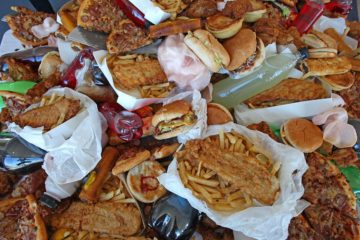Marathon training calls for a well-structured training plan. This includes the actual running and related workouts, along with a proper diet plan. A full marathon is 26.2 miles long, and it’s not easy to run that distance non-stop unless your body is well-prepared. Marathon training plans typically require 16 to 20 weeks of training, so that your body gets used to running for long stretches of time. Runners are also advised to use a few long runs as “dress rehearsals” a month or two before the actual race, where they follow the routine they will be required to on race day. This includes diet (of the previous day as well), shoes and clothing; this helps to correct any problems that may arise, ahead of race day.
A lot has been said about what runners should eat and drink before, during, and after their run on race day. However, it is also important to follow a suitable diet during the entire training period, as this will help in building endurance levels and provide the body with enough energy to run long distances. Moreover, the diet of a regular runner is quite different from that of someone who may be health-conscious but isn’t training for a long run. If you’re thinking of slipping on those running shoes, these are 10 things you should keep in mind regarding your diet.
- Eat Food That Makes You Happy
Training for a marathon doesn’t mean you need to choke down your food because you want to eat healthy. You don’t need to eat food you don’t like. Forcing yourself to eat something may work for a week or so, but you’ll be unhappy and revert to unhealthy food instead. Find foods you like that will meet your training needs, and make them a part of your diet. You’ll also want to keep things simple; most runners have regular jobs and can’t spend hours planning their diet. Simple and tasty makes you stay focused on eating healthy. - Eat Enough Calories
Whole-grain complex carbohydrates are your friend during the training period. They keep you feeling full and give you enough energy for your training needs. You’ll be consuming much more carbohydrate than protein, because you’ll be burning more fuel through your runs. - Prepare Your Food
You probably won’t have time to plan your diet everyday, so it’s a good idea to spend some time at the beginning of the week to plan that week’s meals. This involves getting the ingredients required for your cooked meals, as well as enough healthy snacks for the time between meals. Many runners rely on slow cookers and cooking in bulk, as they help save time overall. - Treat Yourself
A few “cheat foods” as a reward for following your diet plan are absolutely fine. In fact, they allow you to stay motivated and focused on your plan without going overboard. - Eat Regularly Throughout The Day
Runners usually eat small but regular meals throughout the day because they are burning more fuel as a result of their training. A serious runner’s daily diet may look like this: pre-run meal, post-run recovery meal/drink, breakfast, lunch, snack, post-run snack (after a second run), dinner and post-dinner snack. The meals are heavy on the carbohydrates, but also have healthy portions of protein, fat and other essential nutrients that are required for endurance and recovery. - Eat Healthy Around Your Runs
You should eat healthiest immediately after and in the hours following training, with nutrient-rich calories. This ensures optimal recovery. - Plan Your Race-Day Diet
You could train for weeks and still get it wrong if you don’t eat properly on the day of and during the actual race. Eating too little may cause you to lose too much energy and you won’t be able to finish your run; eating too much will make you run to the bathroom. You should plan what you’ll eat during the run as well, as mid-run fuels like sports drinks, gels and gummy bears helps in sustaining the energy required to complete the run. - Ensure Proper Recovery
You’ll be training hard for quite a few weeks, straining muscles and causing muscle breakdown. Your diet should include nutrients that enable your body to recover well, reducing chances of serious injuries. A popular choice is casein, which is a slow-releasing protein that lessens muscle breakdown while the body is asleep, and ensures optimal recovery. - Everybody’s Different
Everyone’s body responds differently to different foods. Especially for runners, training and nutritional demands vary from person to person. Don’t blindly follow a random diet chart from a friend or the Internet! What works wonders for one person may make someone else sick. - Find Out What Works For You
You need to experiment with a couple of different foods and plans to figure out which ones suit you best and are the simplest for you. Use standard diet plans as a template which you can tweak according to your specific needs. There is no perfect plan out there; it’s all about knowing your body and knowing what to feed it.
Considering a balanced diet? Join the Fibrasina movement today and aim for a healthier tomorrow.



